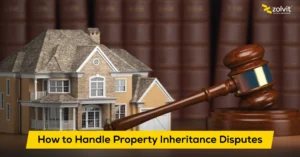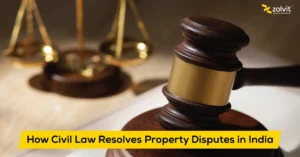Property disputes are quite common, especially following a person’s demise. With respect to inheritance, disputes can arise among heirs when it comes to the property in question: land, a house, or an investment. A valid will is supposed to clarify how an asset should be distributed. This is where probate of will in India plays a key role. Probate ensures that the will is recognised by law, giving the executor the authority to distribute assets correctly. This blog explains the probate process, its importance in property disputes, and how to handle legal challenges effectively.
What is Probate?
Probate process is the legal process through which a court validates a deceased person’s will and grants the executor the authority to administer the estate. The probate of will in India ensures that assets are distributed according to the will, debts are paid, and any disputes are resolved legally.
Is Probate Mandatory?
A probate certificate is not always required. The necessity of probate depends on several factors, such as:
- The nature and value of assets.
- Ownership type (joint ownership may not require probate).
- Local laws and jurisdictional rules.
However, probate becomes mandatory when:
- The will pertains to assets located in West Bengal, Chennai, or Mumbai.
- The will is made by a Hindu, Jain, Sikh, or Buddhist residing in these areas.
- The estate includes both movable and immovable assets.
Even when not mandatory, obtaining probate is advisable if there is a risk of the will being challenged.
How Does Probate Help in Property Disputes?
Property disputes often arise when family members or other claimants contest a will’s validity. A will lawyer plays a crucial role in ensuring that the probate process is properly managed and disputes are settled efficiently. Probate helps resolve these issues by:
- Providing Legal Validation: Probate ensures the will is authentic and executed as per the law.
- Preventing Fraudulent Claims: Without probate, false claims on the deceased’s assets can emerge.
- Authorising the Executor: The executor gains legal authority to distribute assets fairly.
- Settling Disputes in Court: If there are conflicts, probate offers a legal framework for resolution.
Without probate, property disputes can drag on for years, leading to financial and emotional distress for beneficiaries.
How to Obtain Probate in India?
The probate of will involves five key steps that ensure the will is legally validated and executed properly.
1. Filing a Probate Petition
The executor named in the will must file a petition in the local civil court along with:
- The original will.
- Death certificate of the testator.
- Names and addresses of legal heirs.
- Applicable court fees.
2. Notice to Legal Heirs and Public
The court issues notices to the deceased’s legal heirs and publishes a public notice in newspapers. This allows anyone with objections to come forward.
3. Proving the Will’s Validity
The court examines:
- Proof of the testator’s death.
- Whether the will is the last valid document.
- Signatures of witnesses and overall legality.
4. Addressing Objections
If anyone contests the will, the case turns into a suit, requiring hearings and evidence presentation. If no objections arise, the probate process moves forward smoothly.
5. Grant of Probate
Once satisfied, the court issues a probate certificate, granting the executor full authority to manage and distribute the estate.
How Long Does the Probate Process Take?
The duration varies depending on:
- Complexity of the estate.
- Presence of a valid will.
- Legal disputes among beneficiaries.
- Court workload and backlogs.
On average, probate takes six months to two years, though disputes can extend this timeline further.
Common Challenges in the Probate Process
- Disputes Among Beneficiaries: Heirs may disagree on asset distribution.
- Contested Wills: Claims of undue influence or fraud can delay probate.
- Outstanding Debts and Taxes: Executors must ensure debts are cleared before asset distribution.
- Court Backlogs: In metro cities, delayed court processes can slow probate proceedings.
Importance of Property Lawyers in Probate and Property Disputes
A property lawyer plays a crucial role in probate of will and resolving disputes by:
- Ensuring Legal Compliance: Lawyers ensure the will meets legal requirements.
- Handling Objections: They represent the executor or beneficiaries in court if disputes arise.
- Managing Documentation: A lawyer ensures all required paperwork is correctly filed.
- Advising on Estate Planning: They help avoid legal issues by drafting clear, legally sound wills.
Consulting a property disputes lawyer can prevent costly legal battles and speed up the probate process.
Case Study: Legal Solution on Will Probate Process in Property Disputes
In one of our cases, a client was denied access to a property mentioned in a legally valid will. The relatives not only refused entry to the property but also withheld essential documents like the death certificate, making it difficult to initiate the probate process.
With legal guidance, the client followed a structured approach—starting with obtaining the death certificate through legal channels, filing for probate, addressing family objections, and validating the will in court. The court granted probate, confirming the client’s rightful ownership and issuing a property handover order.
This case highlights how probate, supported by legal expertise, can help resolve inheritance disputes and ensure the deceased’s wishes are honoured.
How Zolvit Can Help
At Zolvit, we offer expert legal services for probate and property disputes. Our team assists with:
- Probate Filing & Documentation: We handle all necessary paperwork to streamline the process.
- Legal Representation: Our experts represent you in court if disputes arise.
- Will Verification & Execution: We ensure wills are legally valid and executed properly.
- Estate & Asset Management: We provide guidance on legally distributing assets while ensuring compliance.
With Zolvit by your side, you can navigate the probate process with confidence and ensure a hassle-free resolution of property disputes.
Conclusion
For the distribution of assets in a legal and equitable manner in respect of a deceased person, it is better to probate a will. This gets more critical when disputes about property emerge. Though tedious, the whole procedure assures that the desire of the deceased is given priority and prohibits further legal quarreling. Legal assistance of a competent property lawyer from Zolvit smoothens the process of probate and protects beneficiaries from unnecessary legal proceedings.
FAQs Related to Probate of Will in India
Can a property be sold while a probate case is still going on?
No, the executor does not have legal authority to sell or transfer the property until probate is granted. If someone tries to sell during the process, it may be challenged in court and declared invalid.
Is there a deadline to file for probate after someone passes away?
No. There’s no fixed deadline, but it’s best to apply for probate within 3 years of the testator’s death. Delays can raise doubts about the will’s validity and make the process more difficult if legal heirs are untraceable or if disputes arise.
Can I challenge a will even if probate has already been granted?
Yes, but it becomes more complex. You’ll need to file a suit in civil court to revoke or set aside the probate by proving fraud, coercion, or mental incapacity of the deceased. Courts will closely examine such claims, especially post-probate.
What happens if two different wills for the same person are discovered?
In such cases, the most recent valid will is considered. The court will examine both documents, check dates, witness signatures, and any signs of revocation. Probate will be granted only for the final will, provided it meets legal requirements.
My name is not in the will, but I’m a legal heir. Can I still claim the property?
Yes, you can contest the will if you believe it’s unfair, forged, or was made under pressure. The court will assess whether the will excluded you legally or if your claim is valid under inheritance laws.
Does the probate process differ for agricultural land or ancestral property?
Yes. Agricultural land in some states is governed by state-specific laws and may not require probate. Ancestral property is also treated differently; even with a will, courts may consider the rights of all coparceners before granting probate.
Can probate be denied if the witnesses to the will are unavailable?
Yes, if witnesses are missing and there’s no other proof of execution, the court may delay or reject the probate. However, secondary evidence like handwriting experts or people familiar with the will-making process can help support your case.
What if one legal heir refuses to cooperate during the probate process?
The court will issue them a notice. If they don’t respond, the process continues. If they object, the case may turn into a contested suit. A lawyer can help mediate or represent your case to ensure a timely resolution.




